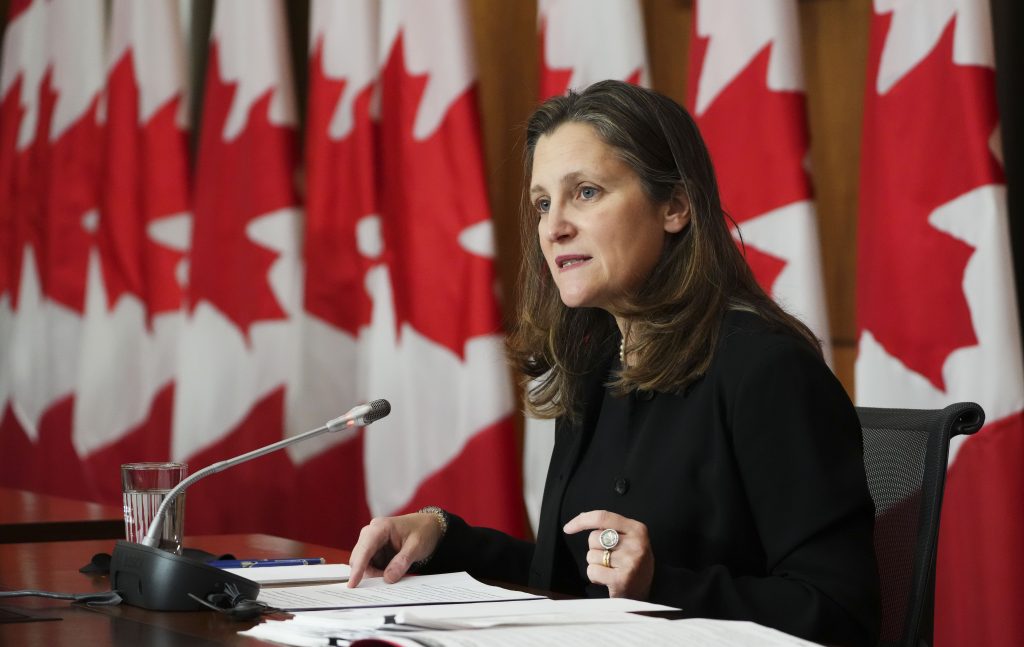Business and Economy
With inflation pressures rising, Liberals to give budget update on Dec. 14

OTTAWA — Canadians will soon get an update on the health of federal finances and the government’s outlook for an economy facing high inflation rates, flooding in British Columbia and the emergence of a new variant of COVID-19.
Finance Minister Chrystia Freeland will deliver the update on Dec. 14, just three days before MPs are scheduled to leave Ottawa for a winter break.
Federal finances have taken a beating during the pandemic as the treasury pumps out unprecedented aid. The government predicted the deficit for last fiscal year would be $354.2 billion, and nearly $155 billion this year.
Higher oil prices among other economic factors are expected to pad the government’s bottom line. UBC economist Kevin Milligan estimated the extra wiggle room could be as much as $10 billion, giving the Liberals some budgetary breathing room just past the midway point of the fiscal year.
“Our government’s focus is to finish the fight against COVID and to support our recovery from the COVID recession,” Freeland said in the House of Commons on Thursday “We know it’s important to Canadians that we are careful and transparent with our nation’s finances.”
Shortly after Freeland spoke, MPs voted to send the Liberals’ latest aid package for a committee review, likely on Monday.
Freeland will face a two-hour grilling on the $7.4-billion plan to provide support for workers affected by lockdowns, and targeted help to the hardest hit businesses.
Politically, the New Democrats are looking for more spending on aid to workers after benefits were cut off, with deputy leader Alexandre Boulerice chiding the Liberals for being “completely out of touch” with the needs of Canadians.
Conservative finance critic Pierre Poilievre chided the government for releasing an economic update with only a few days for it to be scrutinized in the House of Commons, and said his party wants the Liberals to reduce spending to pre-pandemic levels to help with cost of living concerns.
The Liberals have promised to spend $100 billion in stimulus, and pledged billions more in the election campaign, which has stoked warnings from experts that too much spending could fan inflation by increasing consumer demand at a time when the supply of goods can’t keep up.
“It seems to me that you combine this with all the savings Canadians have right now and that’s a lot of money in the economy in the short-term,” said Robert Asselin, senior vice-president of policy at the Business Council of Canada and a former Liberal budget chief.
“You just want to be careful not to fuel more consumption, more demand, and make inflation worse.”
Rebekah Young, Scotiabank’s director of fiscal and provincial economics, said it would make sense to hold back on unleashing major parts of the extra $53 billion in net new spending pledged on the campaign trail, at least for now until inflation rates start coming down.
“I expect this spending still has a good chance of seeing the light of day, just not before the holidays,” Young said.
She said messages coming out of the Finance Department point to a minimalist update instead of one with many new spending measures.
In place of spending, the Liberals are being asked for details about how to tackle supply-chain issues that have helped send the inflation rate to an 18-year high, which wasn’t in the government’s outlook in the spring budget.
“It’s important for them to set out what their strategy is to deal with these changed circumstances,” said Perrin Beatty, president of the Canadian Chamber of Commerce.
The government’s response to inflation has been to point to its national child-care strategy, which aims by next year to lower rates by half on average, and its promises to spend more to make housing more affordable.
Asselin said the child care spending, while helpful, won’t address the scale of inflation issues now. He also said the Liberals may not be able to address many of the vulnerabilities in the housing sector, noting there is little the government can do once you own a house and have a mortgage.
Milligan, in an analysis for the C.D. Howe Institute, suggested the government not add too much debt to “preserve borrowing capacity for future crises” and prepare for extra costs associated with an aging population.
This report by The Canadian Press was first published Dec. 2, 2021.
Jordan Press, The Canadian Press





















